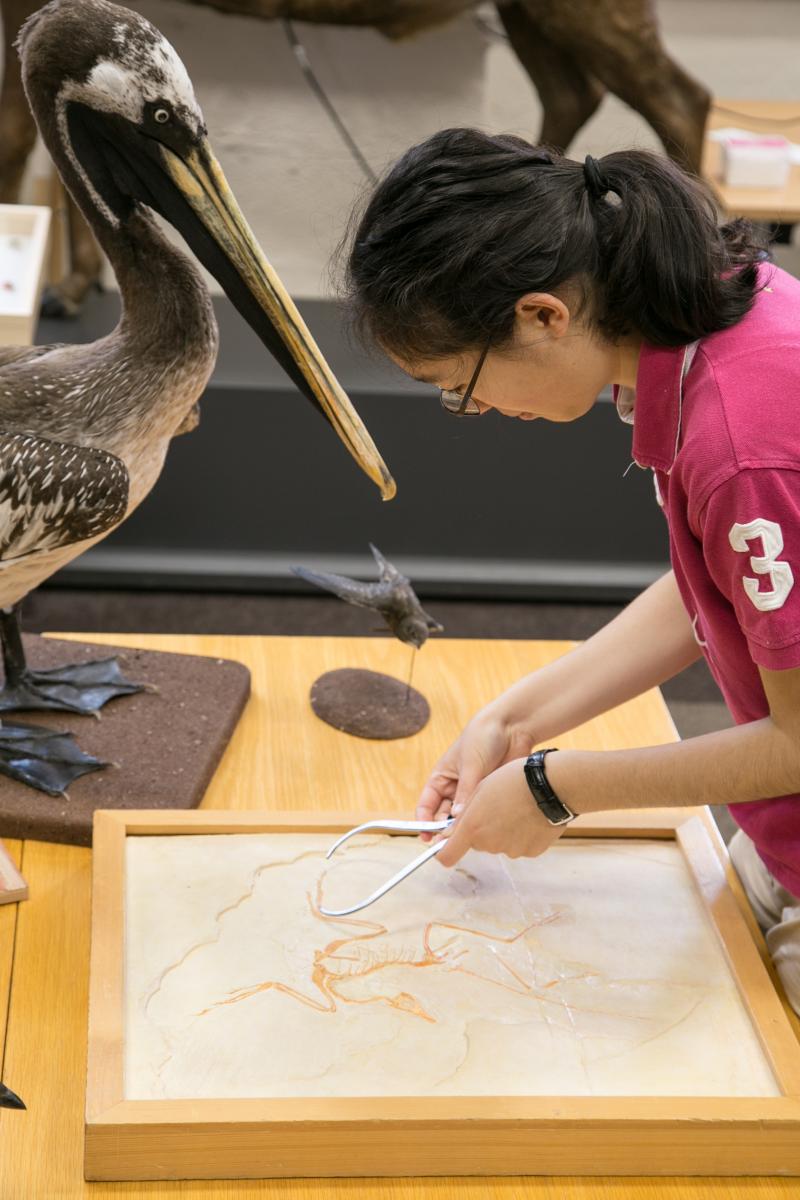Natural History Investigators
Natural History Investigators is a group that was formed to provide 14–16 year-olds with a chance to explore their interest in nature. Young people taking part have the freedom to devise and carry out their own project using museum specimens in their free time.
Background
The Natural History Investigators group was developed with the following awarenesses in mind:
- There are few opportunities for teenagers to develop their interest in science outside of the classroom.
- Schools can sometimes lack the resources to help students gain experience in planning experiments and undertaking practical work. We therefore aim to give young people extra opportunities build on their core scientific skills.
- With its incredible artefacts and exhibits, the museum is a source of inspiration for thousands of visitors. However, there is only so much that you can learn in one-off trip to the museum. Natural History Investigators helps provide aspiring scientists with extra opportunities to pursue their interest in the natural world.
Audiences
This opportunity is primarily for young people educated in the state sector. Natural History Investigators focuses on small-group learning and is a great extra-curricular activity for students. The opportunity is advertised in the Museum, during school visits, and through the Museum’s teacher network. However, we don’t ask teachers to nominate students; young people are encouraged to apply to the programme directly and independently.

Aims
We hope that our young Investigators will meet friends with a shared interest in the natural sciences and enjoy developing their interests using specimens from our collection. Natural History Investigators also provides the museum with the opportunity to showcase our scientific research, and allows young people to meet the scientists behind the wide variety of research projects that take place here.
Delivery
Each Saturday has a flexible structure. Sometimes, our Investigators enjoy a short talk from a scientist. On other occasions, Investigators will participate in a group activity -- which might involve a behind-the-scenes tour or an object-handling session. The rest of the time, our Investigators will work on their individual projects.
Investigators' projects culminate in a science communication activity, for instance hosting a stall at a family science fair or working on a display case in the Museum.
Outcomes
Natural History Investigators provides a relaxed and informal atmosphere for young people to learn about science. Investigators can choose to work on their own or in groups for part of the time. Friendships form, and participants support and entertain each other in a variety of ways. Investigators have plenty of opportunity to meet the researchers at the museum and experience scientific research that is driven by curiosity and creativity. Researchers also enjoy meeting with young Investigators and develop their own youth-engagement skills.
By the end of the program, many group members are keen to join the Museum's youth forum and continue their relationship with the museum.
Investigators have plenty of opportunity to meet the researchers at the museum and experience scientific research that is driven by curiosity and creativity. Researchers also enjoy meeting with young Investigators and develop their own youth-engagement skills.
By the end of the ten weeks, many group members are keen to join the Museum's youth forum and continue their relationship with the museum.
I liked how enthusiastic everyone was. I got enough freedom to do what I wanted and came up with my own question [to study]. The whole thing was brilliant. Not only did I learn a lot, I also made some new friends.
Reflection
Natural History Investigators provides a different kind of opportunity to science lessons at school. Working in a group, Investigators are able to develop professional relationships and friendships with other young people who have identified their interest in nature.
In future, we wish to work with people at an even earlier stage to help bring their interest in natural sciences to the fore.
Exciting News: Investigators Returns This September!
Our January Investigators sessions were a success – thank you to everyone who took part! With 100% of participants expressing appreciation for the museum experience and 90% saying they would return, it’s clear the programme is making an impact. Now, we are thrilled to announce that the September Investigators programme kicks off next month!
Running every Saturday from 6 September to 4 October, 14.00–16.00, this five-week experience offers students the chance to dive into natural history through hands-on workshops, collaborative projects, and time spent with passionate mentors.
The January session showed that engagement works:
- 80% of students reported an increased interest in museum topics.
- Every single student who started off only somewhat interested became very interested by the end.
- 70% rated mentor enthusiasm a perfect 5/5.
Several students even expressed interest in conducting their own independent research—evidence of a growing, long-term investment in scientific curiosity. We have an additional session this September to facilitate this.
This is your chance to explore, discover, and connect with the natural world in a welcoming and inspiring space.
To sign up or find out more, email us at education@oum.ox.ac.uk.
We can’t wait to welcome you this September!
Download the Natural History Investigators case study in pdf
Project contact
Devika (Email)





